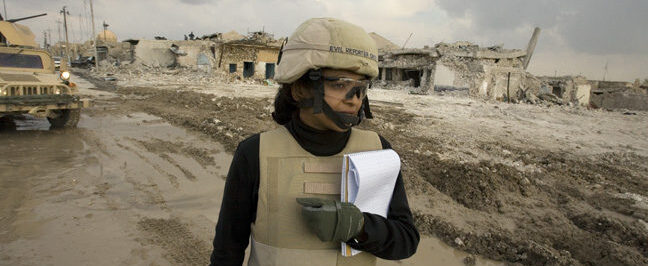
I fought off tears as I read Sunday’s New York Times. The news from Iraq was horrifying.
A vicious civil war seems imminent as fighters from the Islamic State of Iraq and Syria (ISIS) point their guns toward Baghdad.
They are men who make al-Qaeda look like nice guys. And the Taliban, wimps.
They have taken over much of Nineveh province — Mosul, Iraq’s second largest city, and Tal Afar. They are now taking aim at Samarra and threatened to destroy a historic Shiite shrine there. An attack on that shrine in 2006 unleashed sectarian bloodshed. Entire neighborhoods in Baghdad and other places were ethnically cleansed.
I remember how hard it was after that to make amends.
I was in Anbar province when the Sons of Iraq program was just getting off the ground. It began with Sunni Sheik Sattar al-Rishawi who helped launch the Anbar Awakening, a movement to stop the extreme violence that had gripped Iraq’s only Sunni-majority province.

Cities like Fallujah and Ramadi looked apocalyptic. I don’t think I saw a single building in Ramadi that had been spared from bullet holes.
I walked the streets of a Ramadi neighborhood called Melaab with Able Company of the 1st Battalion, 9th Infantry Regiment. The soldiers called the place “the heart of darkness.”
When I asked residents what it was like to live there, they glided their right index finger across their throats. Sunni insurgents brazenly beheaded people in public and distributed videos of the executions.
Ramadi, back then, was the perhaps most dangerous place on Earth. And it was widely believed that the sheiks of Anbar were supporting the insurgents.
Then they began withdrawing that tacit support. I sat with Sheik al-Rishawi’s brother, Ahmed, to understand why his family and others had come around to helping the Americans establish peace.
He showed me his camels (see the photo at the top of my blog), sipped sweet chai and told me the people were just weary from that kind of extreme violence. His own father and brothers were killed by Al Qaeda in Mesopotamia.
He invited U.S. commanders into his palatial home and talked strategy with them. Such friendships had seemed improbable just months ago but the sheiks were determined to bring peace.
From that movement came the Sons of Iraq. Insurgents who once pointed their guns at Americans and their Shiite brethren began to help keep the killing out of their territories. During the so-called surge in U.S. troops, the Sons of Iraq program was in full swing. The Americans paid them $10 a day to keep terrorism at bay.
When the Anbar Awakening first took hold, an uneasy calm came to Ramadi. I went to a polling station where people were voting in a city council election. Amazingly, there was no gunfire that day.
Outside, Capt. Jamey Gadoury, commander of 1-9 Inftantry’s Charlie Company, took his helmet and flak jacket off. We shared lamb and rice with community leaders and members of the Iraqi police.
There were three ways to deal with insurgents, Gadoury told me as he tore a piece of bread and scooped up a chunk of meat. “You either want to kill them, make them go away or get them on your side.”
“So what happened to the Sunni insurgents here?” I asked.
Gadoury stopped chewing and grinned, as though he were onto some awful secret.
“You’re eating with them, ” he told me.
I looked around and suddenly lost my appetite.
I think of my days in Anbar now as I read the tragedy unfolding in Iraq. All that ingenuity to befriend the enemy and make peace. Where did it all go?
Many have blamed Iraqi Prime Minister Nuri al-Maliki for stirring Iraq’s cauldron of ethnic strife. Others have blamed President Barack Obama for withdrawing U.S. troops prematurely.
I won’t go into all the reasons I think that violence has come back with a venomous vengeance — I’ll save that for a later post.
I will only say this: my heart is broken.
